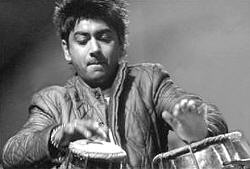|

| [ No Frames ] NAVIGATION: Home Page > Artist Index > Personnel Index > Talvin Singh biography | |||
|
|||
 |
| Talvin Singh Source: news.bbc.co.uk |
Talvin Singh was born in London in the early 1970s. His upbringing in a vibrant and multi cultural city and the sacred heritage of Indian classical and folk music provided an inspiring background. His tastes ranged from Ravi Shankar and Alla Rakha Khan to local bands like the Jam. It was this diverse appreciation for music that inspired the young boy to seriously consider training in tabla.
At 15, after convincing his parents and teachers to allow him to take early examinations, Talvin was initiated to become a disciple of the great academic and musician Lachman Singh Seen of Punjab. After initially spending 3 years learning, he returned to London with a life long endeavour in mastering his instrument and upholding the traditions of the famous Punjab Gharana school.
In demand for studio sessions the young musician was becoming a sought after programmer, producer and tabla artist in the late 1980s underground scene. Still only 18, Singh embarked on a tour with renowned saxophonist Courtney Pine to Russia and Eastern Europe. An estimated 25 pop albums of that time had the melodic tabla rhythms or frenetic programming of the ambitious tabla artist and producer, and he worked with seminal artists Sun Ra and Massive Attack.
It was during this late 80s-early 90s that Talvin recorded with Adrian Sherwood's On-U Sound, a label with equally worldly influences and experimentally-driven ambitions. Sessions for acts such as Audio Active, Keith LeBlanc and especially Dub Syndicate followed, and he even went on the road in 1991 with the label's "Pay It All Back" tour.
Perhaps his greatest musical contribution to On-U Sound's output was sparked in 1994 when he joined Sherwood together with Bim Sherman and Skip McDonald to re-record several of Bim's old reggae tunes in an acoustic/tabla style. The sessions were by all accounts magical and laid the foundations for Bim's and perhaps On-U Sound's master work, 1995's "Miracle" album (ON-U LP67), which featured not only Talvin on tablas but also a full Bollywood string orchestra, recorded on location out in Bombay.
As the early 90's urban club and music scene rapidly progressed, Jungle and Drum 'N' Bass were being born in clubs like the Blue Note in Hoxton Square, east London. Talvin's club night hosted early experiments with the self-invented Tabla-tronics instrument. New acts such as Asian Dub Foundation, Joi and the State of Bengal were presented, as well as the music of A. R. Rahman were introduced to a western audience for the first time. He conceived and licensed a compilation album, "Anokha Soundz of Asian Underground" on his Omni label.
"Anokha..." was received to instant acclaim and his weekly Mondays became the stomping ground for taste-makers, clubbers and record label A&R reps. The highly evolved melody and complex rhythmic intensity of Indian classical music meeting the technology and gritty electronica in Jungle began a music sub-genre, a sound of Asian Underground. Island Records offered Talvin a world-wide recording deal and the company was rewarded for its belief when Singh's 1999 debut solo album "OK" won the celebrated Mercury Music Prize and the South Bank Prize, both for popular music, in the same year.
Talvin Singh continues to write and produce music for personal projects and teaching, as a music director, and a Hollywood and Bollywood icon.
(Adapted from Talvin Singh's biography at World Music Central: worldmusiccentral.org/artists/artist_page.php?id=1492 )






